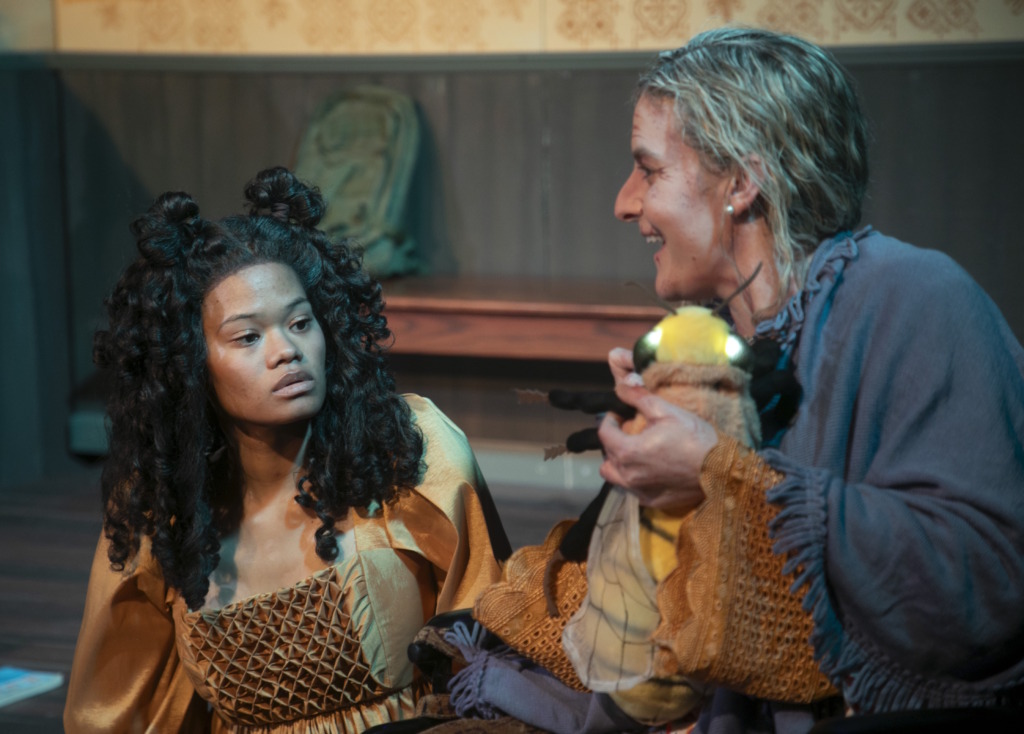Words have meaning. Precision of language is everything. When you wish to communicate an idea, you use your words. And Philadelphia-based playwright Erlina Ortiz has done exactly that with her play Honey Bee Baby, receiving its world premiere this January with Rapid Lemon Productions. Directed by Jalice Ortiz-Corral, this fascinating new work takes a futuristic deep dive into a plethora of timely, relevant topics that will leave you deeply pondering and questioning where you stand on the ethical side of the dividing line when it comes to things like natural resources, inalienable human rights, and childbirth.
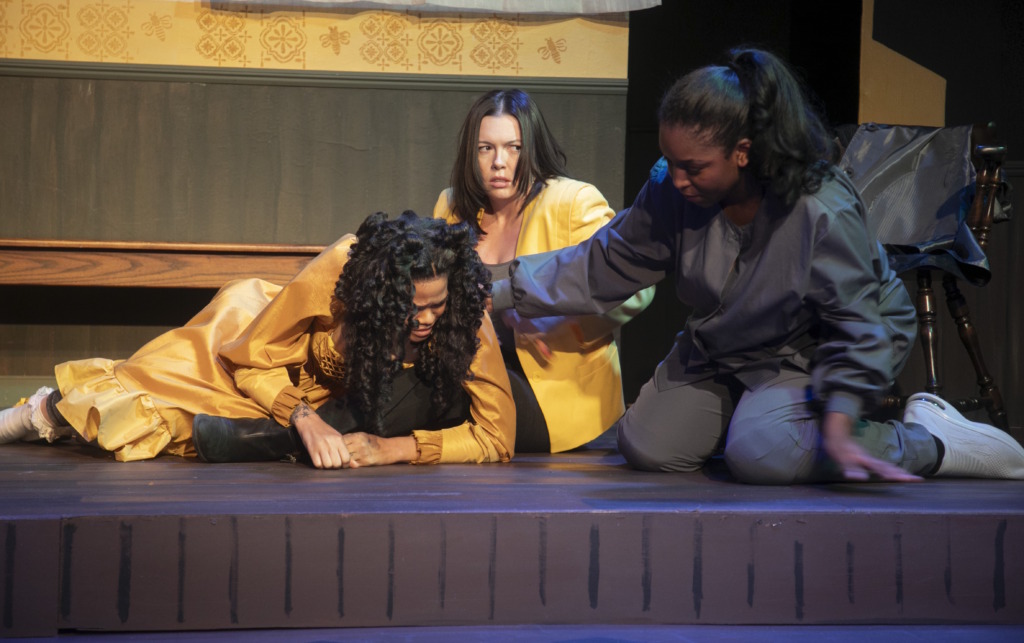
Erlina Ortiz’ play is so much more than an examination of the “haves and the have-nots”, which from a broad-sweeping perspective appears to be the framework for the show. Set in an undisclosed futuristic time and place, though not so far removed from the world in which we currently live that the setting feels unrelatable, Ortiz’ work centers around our protagonist character of Melisa— a health-care-nurse-aid-type professional who lives above ground, where the less-than-financially-equipped are relegated, and who is currently desperately studying for what she perceives is the most important test of her life. A licensing test to grant her the legal authority to have a child.
What sets Ortiz’ play apart from other ‘issues’ plays is twofold. There is subtly and finesse in Ortiz’ writing style, which is becoming a rarity among younger playwrights in this day and age. All too often new works have an agenda or a message that they’re attempting to throw at their audience and it’s done in a blatant, ‘bash-you-over-the-head’ style which just leaves you feeling like you’ve been lectured at. This is not the case with Ortiz’ work. Honey Bee Baby has dramatic action, integrates a great deal of refined expression, particularly when it comes to addressing the disparity between the haves and the have-nots, and has fully developed characters that exist in this semi-dystopic-yet-realistic future world of the play. And there’s a beautiful balance of dark humor sprinkled into the mix. The play moves swiftly, organically, from one scene to the next, the characters are actualized humans with fully activated personalities— even the ones that only appear momentarily. And the topics of discussion are both fascinating and brutal. Ortiz leaves an open-ended anti-conclusion to the work, which I’ll admit, I’m generally not a fan of. From a personal writer’s standpoint I find “draw your own conclusion”-style endings to be lazy. But not in this case. It works and effectively so for Honey Bee Baby, because it isn’t an anti-conclusion or a completely open-ended ‘you-decide’ situation, it’s more of a “they know what might happen, do you, go think on it” experience. All of that ties together quite brilliantly with Ortiz’ work as a whole.
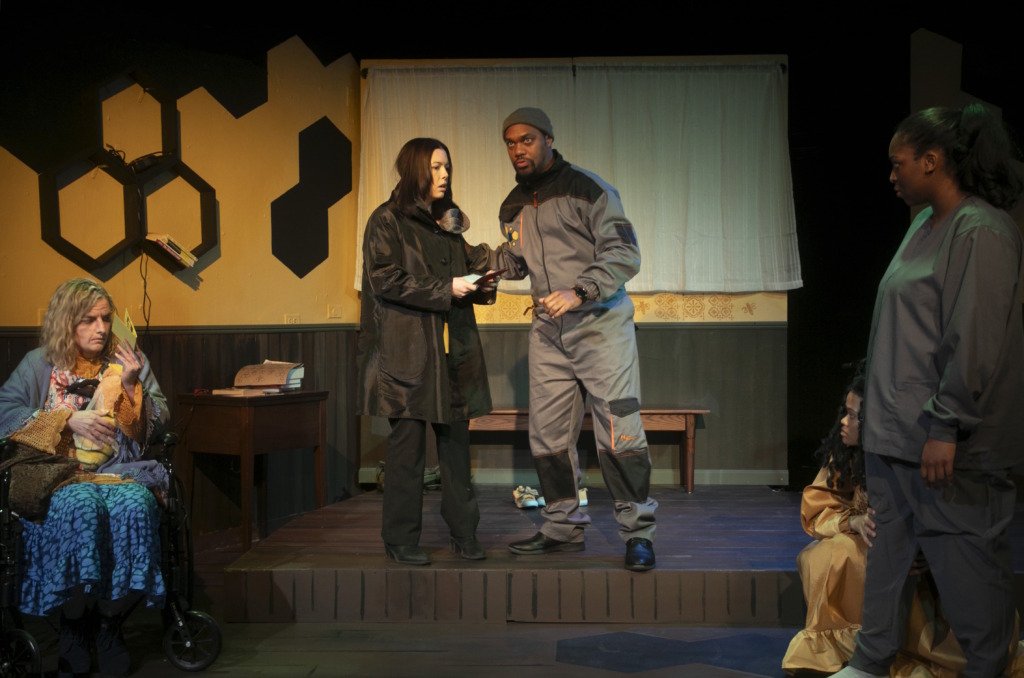
Ortiz’ work asks a great deal of pertinent questions while drawing attention to multiple sides of the various arguments that could be made in response to said questions. Does having affluence make you a good parent? Should there be a licensing test for birthing a child? (There are hoops, tests, means-tested-approval systems in the world in which we presently live if you want to obtain a child that you do not biologically birth, ie— adoption, foster, etc.— so why aren’t there licensing tests for biologically having and raising a child, why is it only reactive, ie— CPS intervention once something has gone wrong— etc.) Why can’t people learn to love their children for who they are rather than who they’re trying to make them out to be? Should you have a child if you know that that child will not have the same rights— access to medical care, school, etc.— as other children? How do we close the divides between the haves and the have-nots? All exquisite questions delicately wrapped into the integral plot points of this work and done with poise, refinement, and the polished sense of an accomplished, articulate playwright.
You could start a dissertation level debate about the subject matters covered in Erlina Ortiz’ work, and I encourage you to see the play, which runs through January 26th 2025 so that you can do so with others who have seen it, but we must move on in terms of this review to discuss the other impressive things included in the theatrical experience— like Stage Manager Janis Beltran and her fluidity of keeping the show moving at a breakneck pace without ever feeling rushed. Or Director Jalice Ortiz-Corral, who is keenly aware of the spatial limitations of the stage and brings the majority of the actor-based action right to the front of the play-space so that the intimate experience of absorbing Honey Bee Baby feels like it’s happening in real-time, right in your lap. Ortiz-Corral lets the audience be that proverbial fly on the wall without feeling like we’ve lost the fourth wall, which is the perfect approach to this type of work. And Justin Nepomuceno’s set is beautiful yet simplistic, not overrunning the space, but keeping with the notion of bees.
Lots of yellow— the color of the honeybee— dominates the show’s aesthetic. Between Nepomuceno’s set and some of Deana Fisher Brill’s costumes, there’s plenty of the honey-gold and sun-bright color to be found. Thankfully not anywhere in Martin Smith’s lighting design, as that would have created an unnecessary saturation wash which would have been overkill. Nepomuceno, Smith, and Brill work in tandem to create the unique aesthetic that is both futuristic and modern, of another time but still relatable, and wholly pleasant and ‘on-brand’, really adding that intrinsic level of enjoyment to the overall theatrical experience. Brill helps play up the delineation of the haves and the have-nots by putting the latter in dull grays and the former in vibrant, almost opulent varieties of yellow— particularly when it comes to the posh party gown-dress featured on Clarisa. And although sound is its own beast, Max Garner’s musical selection for scenic transitions is vibrant and violently humming and thrumming, much like a hive, which helps tie the whole experience together.
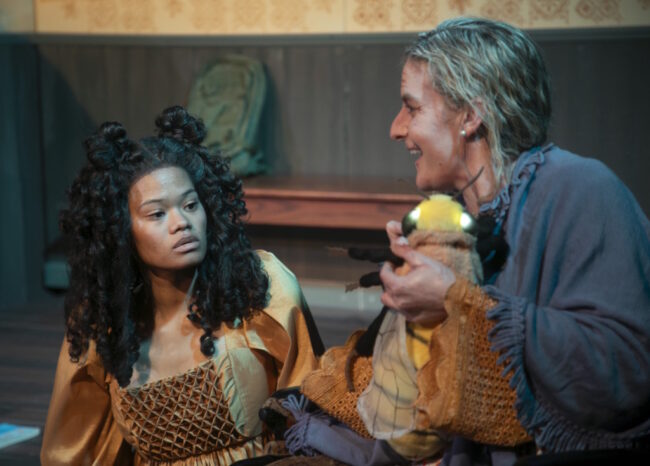
You get a performer like Kaitlyn Fowler, who’s supporting-tertiary character of Maria feels like it was wheeled in from left-field, but also ends up stealing all of the scenes that the character is in. Fowler, who is playing a character multiple decades beyond her actual age, makes the audience chuckle darkly at some of her quippy one-liners and yet brings an earnest emotional gravity to the forefront of her portrayal; you want to feel empathy and a bit of sympathy for this character, even though she is comfortably situated amongst the ‘haves.’
Adanya Koger-Hobson, Valerie Lewis, and Pierre Walters, are in a sense ensemble-multi-role players, taking turns jumping in and out of various roles featured in the production, which lends itself ever so slightly to the overarching lens of “all people are the same regardless of their financial or educational standing.” Walters, as the ‘rescuer’ is hilarious, particularly when interacting with Kaitlyn Fowler’s Maria, and you get a great series of witty barbs exchanged between Koger-Hobson and Lewis when they’re interacting with the Melisa character, discussing whether or not to have/having a child.
Isaiah C. Evans, who plays Ray, the husband and government contract-style-worker of Melisa, gives a quirky portrayal that is also extremely grounded in the reality of the play. One of the ‘futuristic components’ of Ortiz’ work is that perfect elocution of words and language is monitored closely; literally using contractions or shorthand slang is highly frowned upon. Evans’ character takes that notion very seriously and when he speaks it flows almost freakishly naturally off his tongue, which creates the necessary juxtaposition of ‘assimilation versus hesitancy’ when comparing his speech patterns to those of the Melisa character. There’s a dynamic multitude of things happening with Evans’ Ray character, and if there’s one yen for this particular work it’s that the character of Ray be featured just a little bit more.
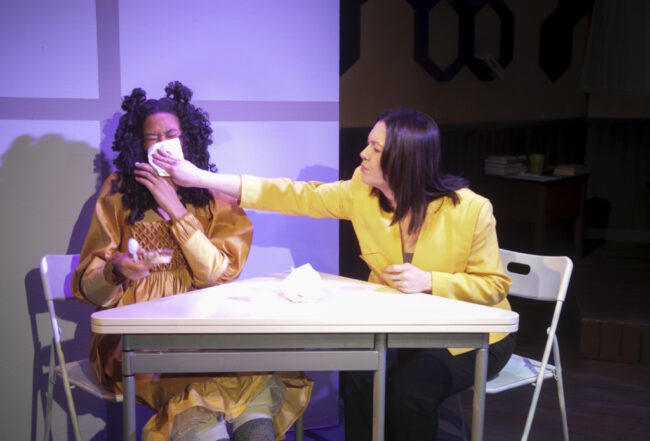
Without preamble, the audience is introduced to Clarisa (K.S. Garner), or rather, a baby-doll-looking girl, playing with her toys. Garner adapts to this young, almost petulant character sublimely. The little tantrums, the overly-expressive emotional outbursts, even her body-language is reflective of the young character’s age and upbringing. This might be the most under-explored character in the work, whilst the character itself has such an important meaning to the plot. Garner does a sensational job of having the audience focus on her, even when her moments on stage are silent.
While Melisa (Rakell Foye) is the central protagonist, Mother/Joy (Sharon Maguire) takes up this dueling role of antagonist-protagonist-plot-device-foil. It’s a bizarre yet completely functional character creation for the work. When you first encounter Maguire, she’s literally an automaton. Maguire has the best handle on the robotic, emotionless, flawless speech patois and cadence that is expected in this neo-futuristic world. Her facial expressions are blank, her body language is blank, it’s like watching AI in action and it’s so good its unsettling. There are moments when little emotional fissures start to sizzle at that pristinely polished veneer, mostly in the second act, and it’s stunning to watch the difference. Maguire plays exceptionally well opposite and against both Garner and Foye, the two characters who her character spends the majority of the production with.
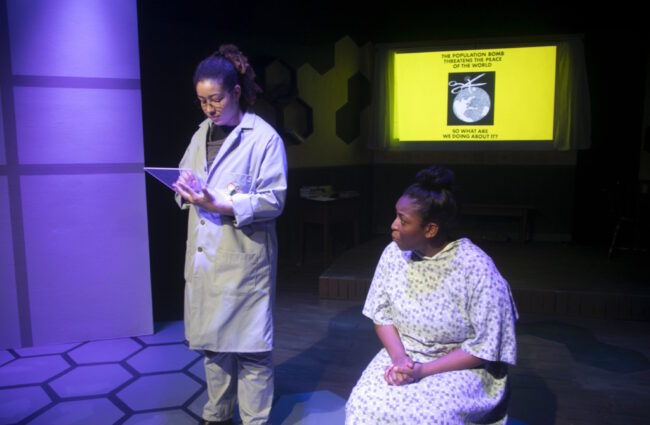
Foye, as the stand-alone protagonist, creates a curious enigma out of this Melisa character. At first her dialogue feels stilted and awkward, and for about a minute you get this feeling of “maybe this isn’t a good actor” because she sounds so out of sync with everyone else. It quickly becomes apparent that this is the character’s struggle— not Foye’s— and as the show progresses, you get a clearer picture of just how much Melisa is internally struggling to assimilate and ‘do right’ by the rules of this future-world in which they live. Much like with Maguire’s Mother/Joy, Foye’s character experiences breaks in her composure, though on a much more evocative and visceral and explosive level. Watching the versatility that Foye displays in this role is astonishing and really draws you into the dynamism of the play as a whole.
It’s evocative, it’s thought-provoking, it’s an exceptional new work and it’s being performed with excellent creatives both on and off stage. For a world premiere, Erlina Ortiz couldn’t have asked for a better experience for her new play Honey Bee Baby. Be sure to catch it with Rapid Lemon Productions before it closes at the end of January.
Running Time: Approximately 1 hour and 45 minutes with one intermission
Honey Bee Baby plays through January 26th 2025 as a Rapid Lemon Productions show in residence at The Strand Theater— 5426 Harford Road in Baltimore, MD. Tickets are available at the door but advanced reservations are strongly encouraged and can be purchased here online.

